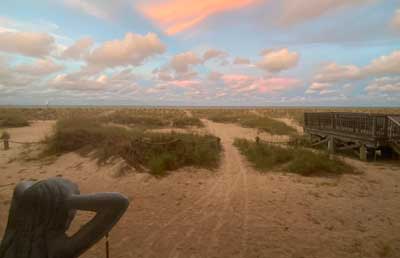Tybee Island celebrates the birth of right whale
Tybee Island celebrates the birth of right whale
“Our North Atlantic right whale, her name is Smoke, was just spotted off our coast with a calf!” wrote Maria Procopio, director of the Tybee Island Marine Science Center. “The staff is having a huge celebration. We’ve waited three years for this!”
Since 2012, the science center has been sponsoring Smoke through the New England Aquarium, the Boston conservation agency that coordinates research about these rare whales that migrate south each winter to give birth off the coasts of Georgia and Florida. An estimated 450-500 right whales remain, making them among the most endangered of all whales.
Smoke has become the unofficial mascot for the center, with its educators toting a full-size inflatable replica of her as a 1-year-old to area schools. It’s accurate down to the unique smoke signal pattern on her head, which gave Smoke her name.
On Jan. 19, Georgia Department of Natural Resources wildlife biologist Clay George and his team, working from a boat after an aerial survey team had left the area, found Smoke and her calf 18 miles east of Cumberland Island. The calf appeared to be about a month old, George said.
The biologists took a tiny skin sample from the calf for genetic testing, and they witnessed Smoke doing something unusual.
“The only notable thing about the sighting was that at one point she surfaced and opened her mouth really wide, exposing her baleen,” George said. “She didn’t appear to be feeding. We have seen other whales open their mouths like this in the Southeast on rare occasions.”
George speculates Smoke may have been trying to cool off.
Researchers survey the whales from planes and boats through the calving season, typically December through March. They have identified seven calves so far this season; the average this century is about 20 calves per season.
“Hopefully, February will bring more,” George said.
Smoke was born in 1996. She’s the daughter of Phoenix, who earned that name when she freed herself from a life-threatening entanglement in fishing gear in 1997. Smoke made Phoenix a grandmother in 2007 when her first calf, a male, was born. She had a daughter in 2010. The sex of this season’s calf has not yet been determined.
“A right whale mother needs to have around four calves to replace themselves in the endangered population,” said Chantal Audran, marine educator and aquarium curator. “Our Smoke is a successful mother, which is hard considering the rate of mortality. She is very near to completing her job. Her grandmother, Stumpy, was called the ‘mother of right whales’ because of her reproductive success. For the children and public, I would remind them that this is the importance of our conservation efforts, which assist in allowing mothers to bravely survive entanglement and ship strikes.”
The New England Aquarium right whale team thinks of Smoke as “Tybee’s whale,” Procopio said. Now the Tybee Island Marine Science center is making plans to sponsor Smoke’s calves as well, with an eye toward Smoke and her family staying linked to its educational mission well into the future.
Right whales are called urban whales for their tendency to swim near the coast. They’re big and gentle, noted Procopio, making them a charismatic connection to the ocean for coastal residents.
“It could be that 30 years from now her whole family tree could be linked to the center,” Procopio said.



